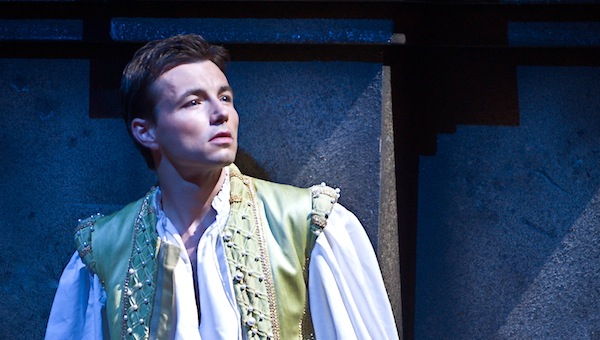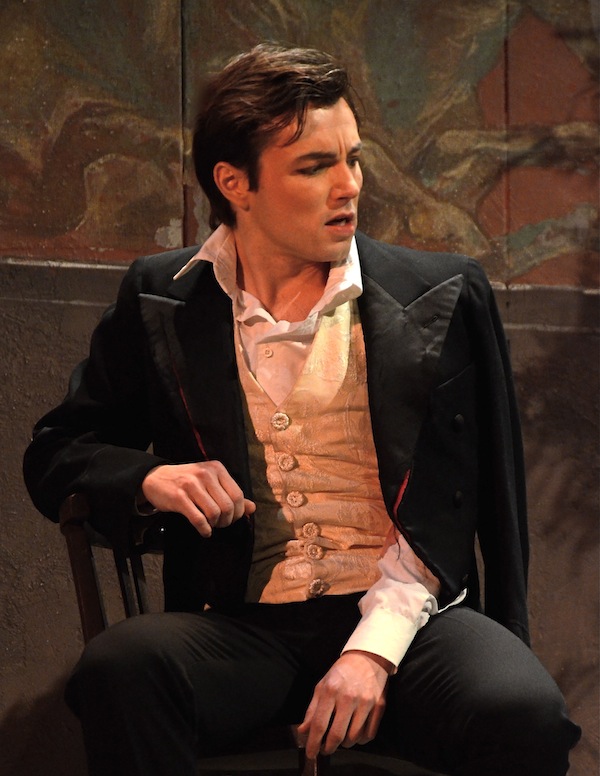
French tenor Sébastien Guèze, a natural Romeo
By Sebastian Spreng, Visual Artist and Classical Music Writer
Effervescent, natural and energetic, French tenor Sébastien Guèze is a rising young star in the international opera scene. The Florida Grand Opera’s audience discovered him last season when he played Christian in David DiChiera’s Cyrano. The FGO now brings Guèze back in a mainstay of the French repertoire, the role of Roméo in Gounod’s beautiful Roméo et Juliette, opening April 21. Born in Lyon 32 years ago, Guèze grew up in Vernoux-en-Vivarais, a town of fewer than 2,000 on the Ardèche massif in France’s Rhône-Alpes region. A child of the sunny south of France, he loves sunny Miami, where he says he feels at home as he holds an animated conversation amid musical scores, fencing rehearsals and sword fight coaching…
How did a country boy with no prior training and almost no knowledge of music, break into opera? I grew up with no contact with opera, only a few TV ads that I sang to myself all the time. When I heard “The Three Tenors” and later Andrea Bocelli, I discovered you could sing in a different way. I started imitating them, and it came so easily to me that my friends suggested I study singing in the city of Nîmes. I showed up at the conservatory and knew only one song, but they accepted me immediately. I went on to the University of Montpellier at the same time as I studied business management, and then to the National Conservatory of Paris, where I finished with honors.
You won the audience choice award at the Operalia World Opera Competition and were chosen “Revelation Artist of the Year” at the Victors in Classical Music Awards. A good start to launch a career… A great one! That led to my debut in Athens as Rodolfo in La Bohème, directed by Graham Vick, and since then I’ve sung in Venice, Helsinki, Valencia, Rome, Orange, Rheims, Cologne, Marseille, Tokyo and Paris.
Why is Roméo a dream role for you? Roméo signals the culmination of a cycle. Roméo et Juliette was the first opera I sang at the conservatory. Then I sang it in concert at the Concertgebow in Amsterdam, and now I can’t wait to sing it onstage for the first time in costume. Romeo sings as naturally as he speaks. In contrast to those who see him as a tormented Werther or Faust, I perceive him as happy, smiling, radiant teenager in love until the last minute. Gounod’s music is the perfect complement to Shakespeare’s tragedy. I remember vividly the impact Baz Luhrmann’s film had on me when I was an adolescent. Then and there I began to feel the need to play him… and at the time I didn’t know I had a singing voice. That is why, I repeat, it’s the culmination of a cycle, as I can now act and also sing the part.
You are specialist in French operas that are virtually unknown these days… Without applying, I was asked to sing in operas such as Gréty’s Andromaque, Lalo’s Le Roi d’Ys, Bizet’s Djamileh, Reyer’s Salammbô, French-Romanian composer Vladimir Cosma’s Marius et Fanny (inspired by three Marcel Pagnol’s plays) and Henri Sauguet’s La chartreuse de Parme, composed in 1939 and based on Stendhal’s novel. I sang the latter in Marseille last February, in the role of Fabrice del Dongo [made famous by the mythic actor Gérard Philipe in the 1947 film]. It is a long and exhausting role, but a rewarding one. It’s an unusual opera, full of wonderful harmonies and tone colors, reminiscent of Debussy. I have the habit of counting the number of minutes my characters are onstage, and Fabrice is there two hours! It’s incredible, the equivalent of three Alfredos!
You like to delve into this little-known repertoire? I love it! Drawn by the richness of that music, I set up camp at the Bibliothèque Nationale and found dozens of unknown operas with characters that were just right for my vocal range as a tenor, but, alas, in many cases the orchestral scores had disappeared, and only the scores for voice and piano remained. I hope to be able to include them in a recital or recording of forgotten arias, and there are some great ones! For now, a recording of mine with another rarity is about to be released, Cherubini’s Lodoiska.
Favorite roles? My next few seasons are packed with Alfredo (La Traviata), Rodolfo (La Bohème), Pinkerton (Madama Butterfly), Nadir (The Pearl Fishers) and Faust. I yearn to sing more Nemorinos and other more lighter, lyrical roles, and I can also sing Werther, a difficult role, but one that I feel at home, and Tchaicovsky’s Lensky (Eugene Onegin). Russians tell me I seem Russian and that my diction is very good. A good compliment, right?
Musical idols and other pleasures? Fritz Wunderlich and Franco Corelli (plus the three tenors and Roberto Alagna and Jonas Kaufmann) and also the Bee Gees and Claude Francois, the author of “Comme d’habitude,” the original version of “My Way.” Sports, running, swimming, the outdoor life, simple and natural as long as I have a French baguette, cheese and the indispensable, ever-present… bresaola [Italian air-cured beef]!
How do you manage the notorious difficulty of singing opera in French? At first, I didn’t notice the difference, because the projection and diction are natural to me. Later I realized how difficult it is for others. The vocals are fiendish and change timbre when you sing them. In any case, the hallmark of the French style is elegant phrasing. That’s priority number one.
What was that “random act of culture” that you staged in Paris on Valentine’s Day? It was a practical joke among friends. They dared me to sing “O sole mio” on the steps of Montmartre, as a sort of improvised Romeo. As my reward, I was doused with a bucket of ice water. You can see the video on YouTube. What you don’t see is the number of people who crowded around me afterwards, asking me to sing some more. It was a lot of fun.
Many years ago, when she was asked what distinguished the Gallic style from the rest, legendary French soprano Régine Crespin replied without hesitation: “charme!” This time, Sébastien Guèze, who possesses that “charme,” will get his due. Rather than with a bucket of cold water, this Romeo will surely be showered with warm applause.

Roméo et Juliette by Charles Gounod (in French with English and Spanish subtitles): April 21, FGO.org; 1-800-741-1010 or (305) 854-1643
Recent Content
-
Artsarticle ·
-
Artsarticle ·
-
Artsarticle ·

